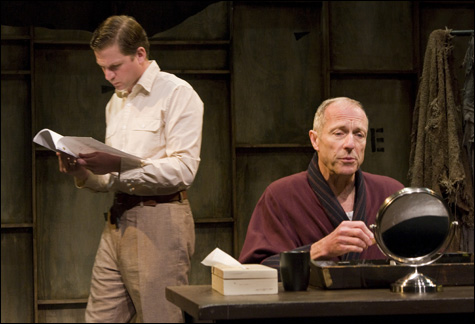
EXITS AND ENTRANCES: Will Lyman (right, with Ross MacDonald) proves he's more than just a pretty voice — not that he needed to. |
There are some playwrights whose work makes you think that a night at the theater is going to be an eat-your-vegetables affair — Arthur Miller, Henrik Ibsen, and South African Athol Fugard are often considered more vegan than visceral. But then you see a sharp production of one of their plays and you realize the menu is meatier than you had remembered, with payoffs as emotional as they are intellectual.
That's the case with Fugard's two-man 2004 play Exits and Entrances, which, directed by Chris Jorie at the New Repertory Theatre (through March 15), features a gem of a performance by Will Lyman as an aging actor confronting the dimming of his professional light. It's the perfect part to allow Lyman to prove he's not just a pretty voice. (He's the narrator of Frontline, Little Children, and BMW commercials.) Although if you've seen him in his increasingly frequent stage appearances around town — The Wrestling Patient at SpeakEasy is next — you don't need further proof.
Here he gets to show his chops in a play about everything from the purpose of art to aging and apartheid. For good measure, he acts out lengthy excerpts from Oedipus Rex, Hamlet, and Bridget Boland's The Prisoner, which is about the detention and show trial of Cardinal József Mindszenty in post-war Hungary.
It's in that last role that Lyman's character, the South African actor André Huguenet, adds what was seen to be the missing link in his previous performances — humility. Or at least, so says the play's other character, who's identified only as — drumroll, please — the Playwright.
The Playwright is, on some level, a stand-in for Fugard. Exits and Entrances is set between 1956 and 1961, when both the Playwright and Fugard were young, unsuccessful playwrights who found their voices after the Sharpeville Massacre, as they began to chronicle the evils of apartheid. The Playwright is also the Narrator (in a solid performance by Ross MacDonald), who tells us straight away that André is no longer with us and flashes back to two incidents in their lives.
It's easy to see Fugard in the Playwright, who limns André's tragedy as his inability to make meaningful contact with others as well as his inability to see a link between theater and the politics of the day. And if that's all there were to Exits and Entrances, it wouldn't be much of a play. But Fugard's particular talent has always been to transcend the limitations of political theater, to bring a Beckett-like sense of life's desperate moments to the table. There's more than a passing resemblance between Fugard's Boesman and Lena and Beckett's Vladimir and Estragon.
Here the Playwright is not a terribly interesting fellow. Fugard has to throw in a psychodrama with the writer's father in order to find any dramatic spark in him. Not only does André get the best lines, but Fugard also gives you the sense that he himself has quite a bit in common with the actor. There's the idea that new theatrical styles have left Fugard in the cold and the feeling, expressed in Valley Song, that he's now irrelevant to how South Africa develops.